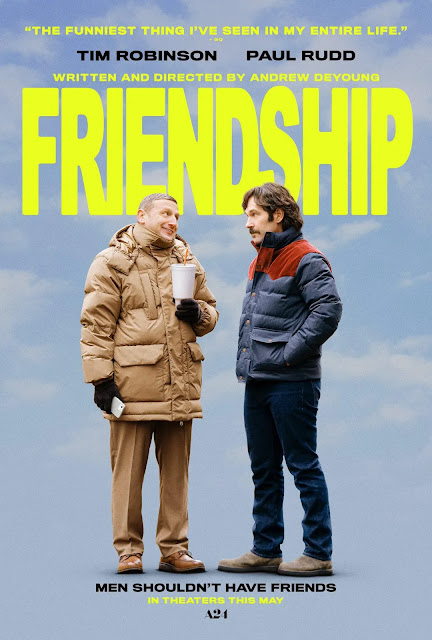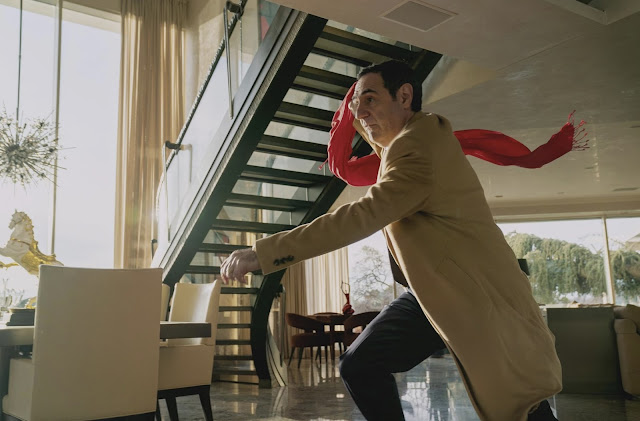Max's Mini Movie Magazine
Search This Blog
Friday, June 27, 2025
Friendship (3/5 Stars)
Thursday, June 19, 2025
Sinners (4/5 Stars)
Sunday, June 8, 2025
Low Cinema and "Dirtier Work"
Sunday, May 25, 2025
Flight Risk (3/5 Stars)
Saturday, May 24, 2025
The Penguin (4/5 Stars)
Tuesday, April 15, 2025
Oscars 2025
Ridgewood, Queens needs a movie theater. Its last one was converted into a Blink Fitness Gym. Documentarian John Wilson of HBO's How To fame is about to open one within a ten minute walk of my home, but his intent seems to be to only show obscure movies in obscure formats on his theater's single screen.
I am still seeing about forty movies and/or TV shows a year, but I am increasingly watching those movies at home and a significant time after their release. Some of this has to do with the lack of a theater within walking distance, some of it has to do with a lack of time because of greater responsibilities. Not an unimportant impediment to watching a lot of movies is the fact that I have much more of a social life than I did when I started writing reviews twenty years ago. That's right, in September 2025, this blog will hit its 20th year anniversary. I'm already thinking of what I will have to say about that. At the top of the list will have to be some sort of explanation as to why I continue to write a blog that next to no-one reads and why, at this point, I'm fairly confident I will never stop doing so. I'm also thinking of re-watching movies I haven't seen in 20 years and writing about that. That plan also requires a decent explanation.
The fact that I am writing reviews of movies I see at home and after a significant delay I don't think immediately affects the quality of the review. (Maybe, I didn't write a Dune 2 review because I felt the in-home experience probably affected my appreciation of the movie). It does however, affect the review's immediate relevance (assuming that it had any relevance to begin with, which is a tenuous proposition). I'm about to write a review about The Penguin, which came out almost a year ago. Much of this has to do with my reluctance to pay a movie ticket price for something I am watching at home. But another reason has to do with simply being late to watch movies in the first place. I spend the first three months of the year catching up on all the well-regarded movies from last year, so as of right now in April, I have barely seen any 2025 movies. So why pay the significant price tag to stream a movie on its opening weekend when I can take advantage of the decreasing price of the movie that came out in January/February that I have not yet seen.
This delay affects the Oscar picks of this year. In particular, three movies that contribute to a sizable amount of my picks may have come out in 2023, not 2024: Godzilla Minus One, All of Us Strangers, and Perfect Days. It isn't actually all that clear to me when these movies came out. I don't recall any of them ever being in any theater and a movie's theatrical release date isn't all that instructive of a movie's general availability nowadays anyway. For example, Godzilla Minus One was notable in that it was nominated for last year's Oscars but could not be seen anywhere at the time of the ceremony, the film being blackballed so that an inferior Godzilla movie could open without undue competition. But since Godzilla Minus One, All of Us Strangers, and Perfect Days were all great movies and I saw them in 2024, I am including them in my picks below.
It is a good thing too because 2024 was yet another weak year for movies. It was a strong year for TV shows and I feel comfortable saying that even though I have not watched the vast majority of TV programs. I say that because I saw Shogun and that television series is primed to be a high water mark of some kind when we look back at it twenty years from now.
The Oscars Best Picture nominees were an eclectic bunch. Some were downright weird and simply not the sort of movie that the Oscars would normally nominate. This reflects the weak year but also the sort of homogenous groupthink that has a grip over Academy voters. What else explains the presence of Emilia Perez? I wrote at length about its poor taste and dubious morality. Something that escaped my critique, but was all over Mexican critiques, was the fact that the language was poorly translated from French into Mexican Spanish and that almost none of the actors were Mexican. This is something the Academy decided to disregard because the main character was transgender. Or take The Substance a disgusting, albeit effective movie. Imagine if such 1980s horror schlock movies like Evil Dead 2 or The Thing were nominated for Oscars. Apparently, the only thing that was missing from those movies was a feminist bent about women over the age of forty not being as hot as they were in their twenties. When the Academy expanded the amount of Best Picture nominees from 5 to 10, what they really wanted was for movies such as The Dark Knight and Wall-E to be nominated. This year, they welcomed the addition of Wicked and Dune: Part Two to the list. Kudos to the plan. But another unintended consequence is a movie like Nickel Boys, which no one saw and indeed wasn't nominated for anything else besides Adapted Screenplay. The movie was nominated because it is the best "Black" movie of the year, a conspicuous category since 2015 (See American Fiction, King Richard, Blackkklansman, Hidden Figures, Selma).
Then there is the Best Picture winner Anora, which is a great movie but which contains lots of graphic nudity and obscene language. As any reader of my blog can attest to, I love Sean Baker, but I never thought I would see the day when he wins four Oscars in a single night. I'm not sure if that is a sign that out-of-date taboos being cast aside or whether it represents the complete collapse of standards. More than anything else, it probably just signifies a weak year. Sean Baker could no longer be ignored because he was the only one that showed up in 2024.
Best Supporting Actor
Karren Karagulian - Anora
David Jonsson - Alien: Romulus
Guy Pearce - The Brutalist
Edward Norton - A Complete Unknown
Kieran Culkin - A Real Pain
Best Supporting Actress
Geraldine Viswanathan - Drive Away Dolls
Moeka Hoshi - Shogun
Margaret Qualley - The Substance, Drive Away Dolls, Kinds of Kindness
Deidre O’Connell - The Penguin
Felicity Jones - The Brutalist
Best Documentary
n/a
Best Production Design
The Brutalist
Conclave
Dune: Part Two
Nosferatu
Shogun
Best Costumes
Conclave
Dune: Part Two
Gladiator II
Nosferatu
Shogun
Best Hairstyling/Makeup
Dune: Part Two
Nosferatu
The Penguin
Shogun
The Substance
Best Use of Cultural Appropriation
All of Us Strangers - Tokyo Ghosts
The Penguin: Italian Mafia
Perfect Days - Lou Reed, Patti Smith, et al.
A Real Pain: Chopin
The Substance: Stanley Kubrick, 1980s Practical Effects
Best Original Score
Daniel Blumberg – The Brutalist
Conclave
Flow
Robot Dreams
Shogun
Best Use of a Song
“Always on My Mind” by Pet Shop Boys - All of Us Strangers
“Blue Bayou” by Linda Rondstadt - Drive Away Dolls
“Jean Kayak and His Acme Applejack” - Hundreds of Beavers
“Redondo Beach” by Patti Smith - Perfect Days
“September” Earth, Wind, and Fire - Robot Dreams
Best Original Screenplay
Sean Baker - Anora
A Real Pain
The Brutalist
Perfect Days
Self Reliance
Best Adapted Screenplay
Andrew Haigh, Taichi Yamada - All of Us Strangers
Conclave
Godzilla Minus One
The Penguin
Shogun
Best Visual Effects
Alien: Romulus
Dune: Part Two
Godzilla Minus One
Hundreds of Beavers
Nosferatu
Best Stunt Direction
Anora
The Fall Guy
Hundreds of Beavers
Monkey Man
Shogun
Best Cinematography
The Brutalist
Dune: Part Two
Godzilla Minus One
Nosferatu
The Substance
Best Actor
Andrew Scott - All of Us Strangers
Adrien Brody - The Brutalist
Jesse Plemons - Kinds of Kindness
Colin Farrell - The Penguin
Hiroyuki Sanada - Shogun
Best Actress
Mikey Madison - Anora
Sydney Sweeney - Immaculate
Cristin Milloti - The Penguin
Anna Sawai - Shogun
Demi Moore - The Substance
Best Director
Andrew Haigh - All of Us Strangers
Sean Baker - Anora
Brady Corbet - The Brutalist
Takashi Yamazaki - Godzilla Minus One
Frederick E. O. Toye et al. - Shogun
Best Picture
All of Us Strangers
Anora
The Brutalist
Conclave
Godzilla Minus One
Hundreds of Beavers
The Penguin
Perfect Days
A Real Pain
Shogun
A Very Good Year (Honorable Mention)
Margaret Qualley





.jpeg)







.jpeg)


.jpeg)









